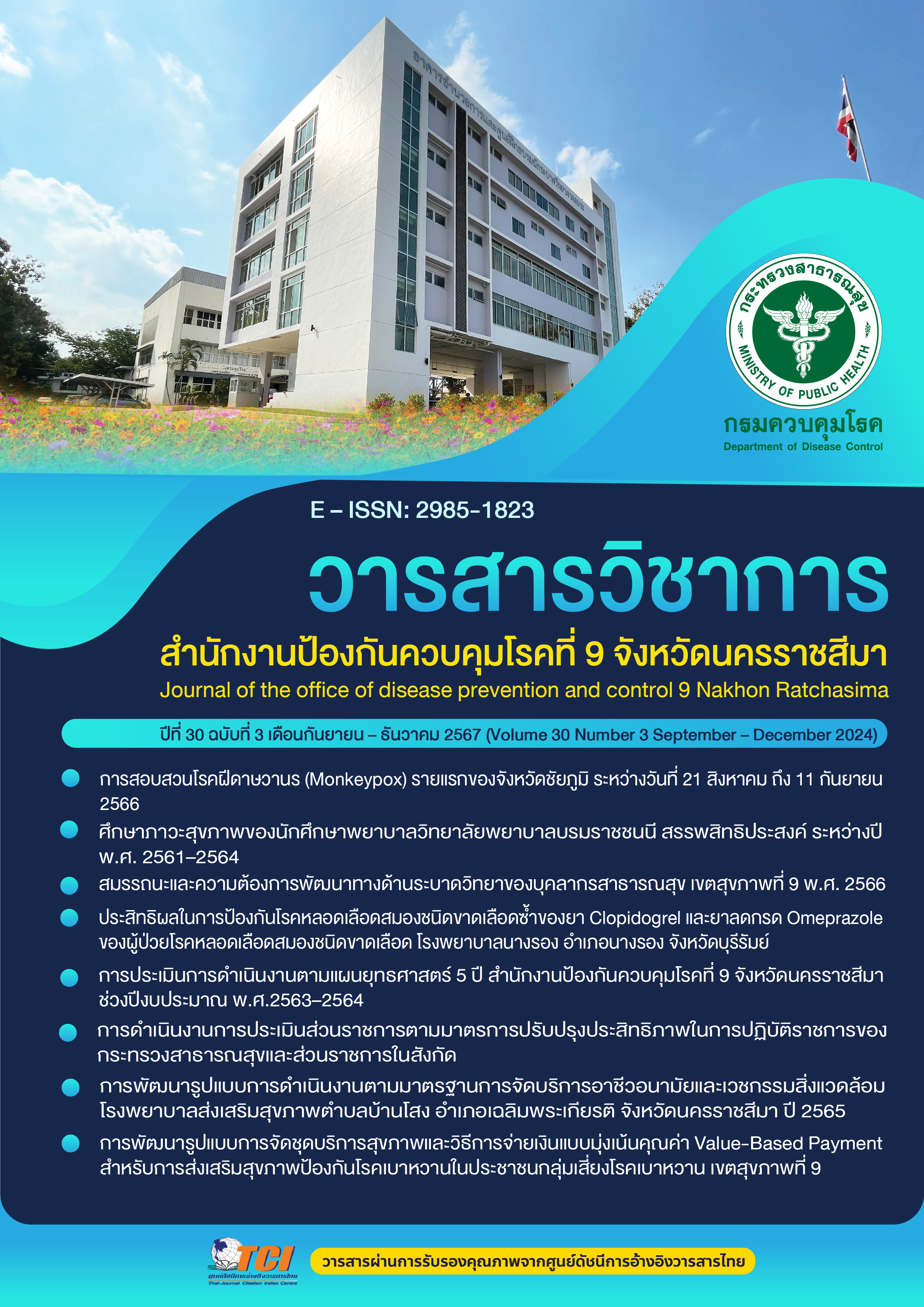Performance of Government Service Assessment According to Enhancement Measures for Efficiency of Government Service in Ministry of Public Health and Affiliated Agencies
Keywords:
Government service assessment, Performance Improvement MeasuresAbstract
This research employed a mixed-methods study, applying Stufflebeam’s CIPP Model as the assessment guidance. The objectives were to evaluate government service performance in accordance with enhancement measures for efficiency and to examine factors contributing to success, obstacles, and recommendations for improvement within the Ministry of Public Health and its affiliated agencies. The sample group for the quantitative research consisted of 108 personnel responsible for implementing and evaluating government service performance under the specified measures. The sample group for the qualitative research consisted of 18 members of committees overseeing the assessment process. Data was collected between June and August 2023 through questionnaires and interviews. Quantitative data were analyzed using descriptive statistics, while qualitative data were analyzed using content analysis. The results revealed the perception of government service assessment performance, based on the enhancement measures for efficiency within the Ministry of Public Health and its affiliated agencies, as assessed by the CIPP model. Context and output evaluations received the highest scores (= 4.43, 4.40; S.D. = 0.55, 0.53, respectively), followed by input and process evaluations which also garnered high scores (
=4.05, 4.18; S.D. = 0.59, 0.55, respectively). To achieve success, executives must recognize the importance of assessing government services as part of the efficiency enhancement measures implemented by the Ministry of Public Health and its affiliated agencies. The organization or public sector should provide adequate resources, including human resources, budget allocations, and information and communication technology systems. Additionally, personnel should possess the necessary knowledge, understanding, and capability to engage in all processes from inception to completion. However, several challenges exist. Executives and staff lack awareness of the significance of assessing government services within the efficiency enhancement framework. Moreover, there are insufficient personnel dedicated to this task, which leads to workload issues. This shortage results in decreased morale, motivation, and productivity. Additionally, shortcomings in the efficiency of information and communication technology systems, as well as in monitoring and evaluation processes, contribute to suboptimal outcomes. These findings suggest the need for executives and relevant personnel to raise awareness, prioritize, and support government service assessment activities that align with efficiency enhancement measures. This involves addressing various aspects, including policy, budgeting, human resources, information and communication technology systems, knowledge dissemination, empowerment, and motivation. Furthermore, it is important to ensure that appropriate monitoring, tracking, and evaluation mechanisms are in place to facilitate continuous improvement.
References
สำนักงานคณะกรรมการพัฒนาระบบราชการ. รายงานผลการพัฒนาระบบราชการ ประจำปีงบประมาณ พ.ศ. 2547. กรุงเทพฯ: สำนักงาน ก.พ.ร.; 2547.
สำนักงานคณะกรรมการพัฒนาระบบราชการ. คู่มือการประเมินส่วนราชการตามมาตรการปรับปรุงประสิทธิภาพในการปฏิบัติราชการของส่วนราชการ ประจำปีงบประมาณ พ.ศ. 2560. กรุงเทพฯ: สำนักงาน ก.พ.ร.; 2559.
สำนักงานคณะกรรมการพัฒนาระบบราชการ. คู่มือการประเมินส่วนราชการตามมาตรการปรับปรุงประสิทธิภาพในการปฏิบัติราชการของส่วนราชการ ประจำปีงบประมาณ พ.ศ. 2566. กรุงเทพฯ: สำนักงาน ก.พ.ร.; 2565.
กลุ่มพัฒนาระบบบริหาร สำนักงานปลัดกระทรวงสาธารณสุข. การประชุมเครือข่ายการพัฒนาระบบราชการกระทรวงสาธารณสุข ประจำปีงบประมาณ พ.ศ. 2565; 2565 กันยายน 20; สำนักงานปลัดกระทรวงสาธารณสุข. นนทบุรี; 2565.
Stufflebeam, D.L. The Methodology of Metaevaluation as Reflected in Metaevaluations by the Western Michigan University Evaluation Center. Journal of Personnel Evaluation in Education. 2000;14:95–125.
กลุ่มพัฒนาระบบบริหาร สำนักงานปลัดกระทรวงสาธารณสุข. การประชุมคณะกรรมการกำกับและประเมินผลการปฏิบัติราชการของส่วนราชการในกระทรวงสาธารณสุข ประจำปีงบประมาณ พ.ศ. 2564; 2564 สิงหาคม 30; สำนักงานปลัดกระทรวงสาธารณสุข. นนทบุรี; 2564.
สำนักงานจังหวัดลำพูน. รายงานการวิจัยการติดตามประเมินผล แผนพัฒนาจังหวัดลำพูน (พ.ศ.2561–2565) ประจำปีงบประมาณ พ.ศ. 2563 [อินเตอร์เน็ต]. 2563 [เข้าถึงเมื่อ 2566 พฤษภาคม 15]. เข้าถึงได้จาก: https://www.lamphun.go.th/uploads/19/2021-04/74f739b87d462cf6418c82513973918c.pdf.
จุฑาทิพย์ ชมพูนุช. การประเมินผลการดำเนินงานพัฒนาคุณภาพ NCD Clinic Plus ปี 2562 พื้นที่เขตสุขภาพ ที่ 5 ในสถานบริการสาธารณสุขของรัฐ สังกัดกระทรวงสาธารณสุข. วารสารควบคุมโรค. 2564;47:300–312.
ทัชชา สิงหทะแสน, อนงค์ เขื่อนแก้ว. รายงานการประเมินส่วนราชการตามมาตรการปรับปรุงประสิทธิภาพในการปฏิบัติราชการของกรมวิทยาศาสตร์การแพทย์ (ดำเนินการปีงบประมาณ พ.ศ. 2560–2562) [อินเตอร์เน็ต]. 2562 [เข้าถึงเมื่อ 2566 พฤษภาคม 15]. เข้าถึงได้จาก: https://bpsd.dmsc.moph.go.th/.
สำนักงานคณะกรรมการการศึกษาขั้นพื้นฐาน กระทรวงศึกษาธิการ. รายงานผลการสำรวจความคิดเห็นโครงการถอดบทเรียนและติดตามผลการดำเนินงานการประเมินตัวชี้วัดตามมาตรการปรับปรุงประสิทธิภาพในการปฏิบัติราชการของสำนักงานเขตพื้นที่การศึกษา ประจำปีงบประมาณ พ.ศ. 2564 [อินเตอร์เน็ต]. 2564 [เข้าถึงเมื่อ 2566 พฤษภาคม 15]. เข้าถึงได้จาก: https://psdg-obec.nma6.go.th/web/540.
เอกรินทร์ อ่วมอุ่ม, ภคพร กลิ่นหอม. การประเมินผลการดำเนินงานตามนโยบายตัวชี้วัดคำรับรองการปฏิบัติราชการของสำนักงานสาธารณสุขจังหวัดเพชรบุรี. วารสารวิจัยทางการพยาบาลและการสาธารณสุข. 2565;2: 28–46.

Downloads
Published
How to Cite
Issue
Section
License
Copyright (c) 2024 The office of disease prevention and control 9th Nakhon Ratchasima

This work is licensed under a Creative Commons Attribution-NonCommercial-NoDerivatives 4.0 International License.
บทความที่ลงพิมพ์ในวารสารวิชาการสำนักงานป้องกันควบคุมโรคที่ 9 จังหวัดนครราชสีมา ถือว่าเป็น
ลิขสิทธิ์ สำนักงานป้องกันควบคุมโรคที่ 9 จังหวัดนครราชสีมา



